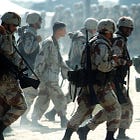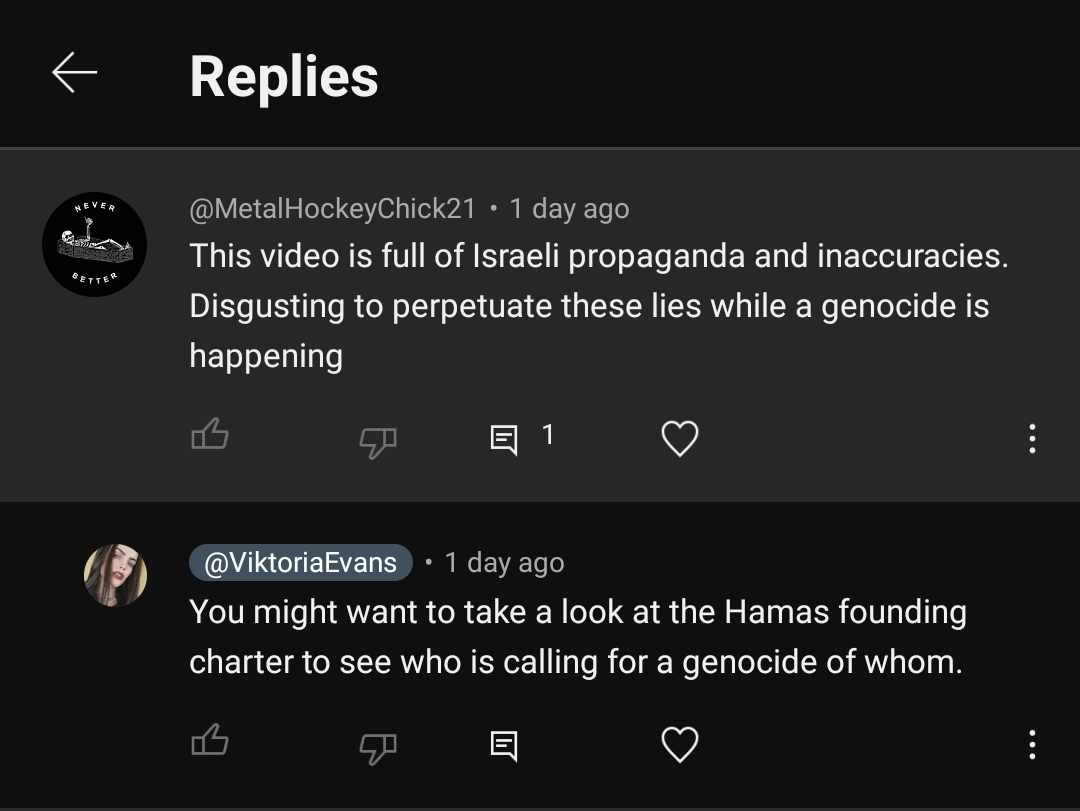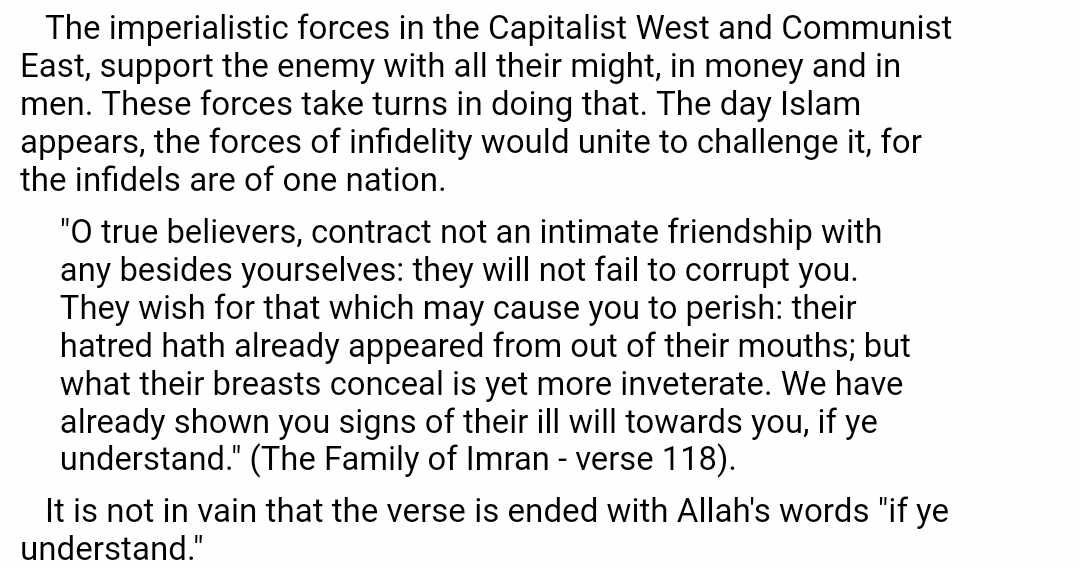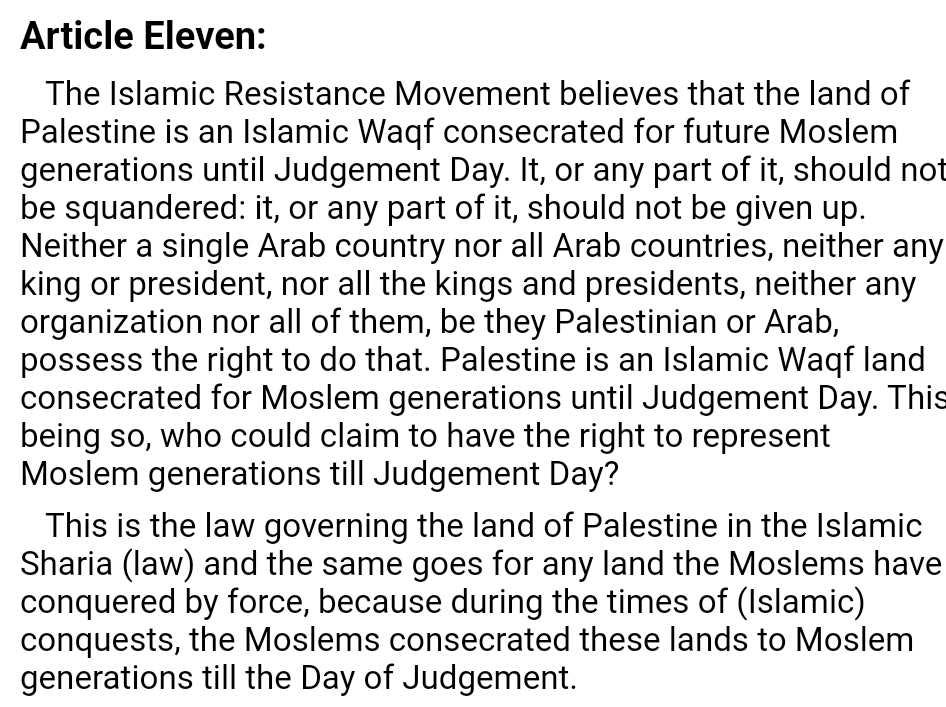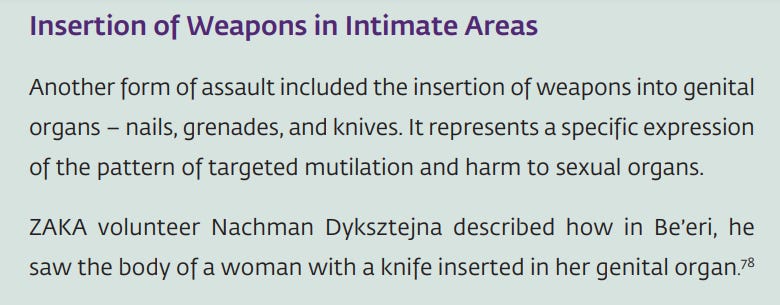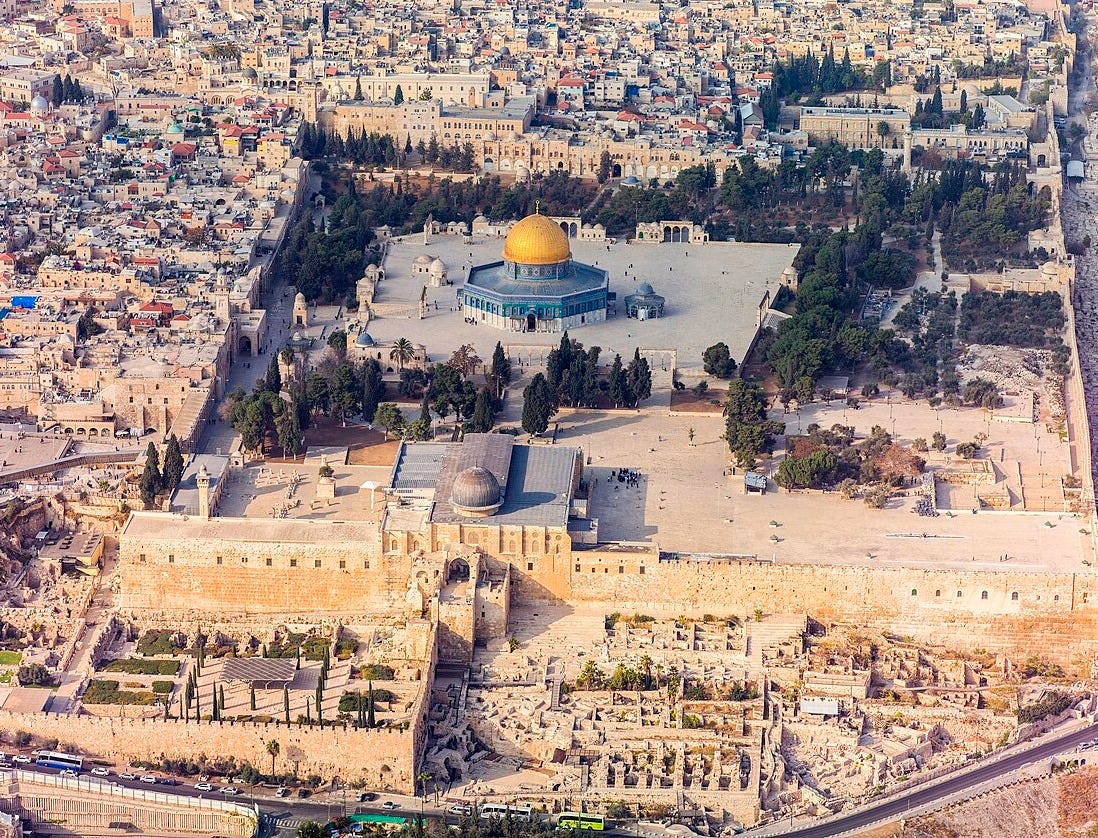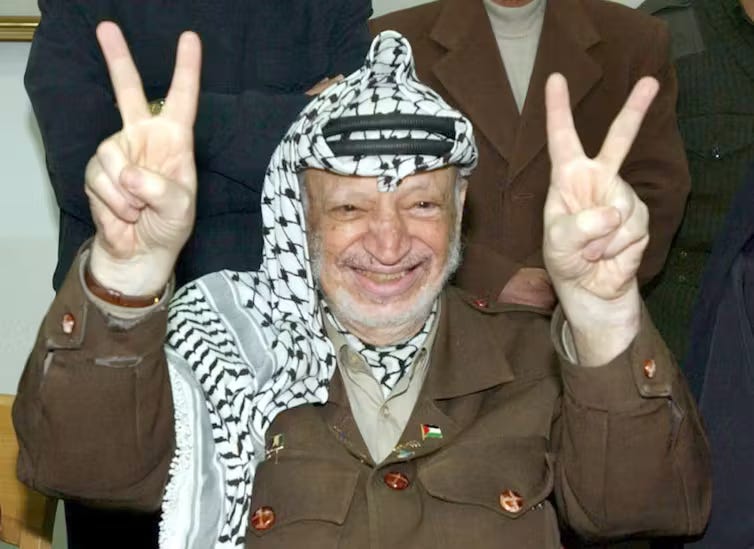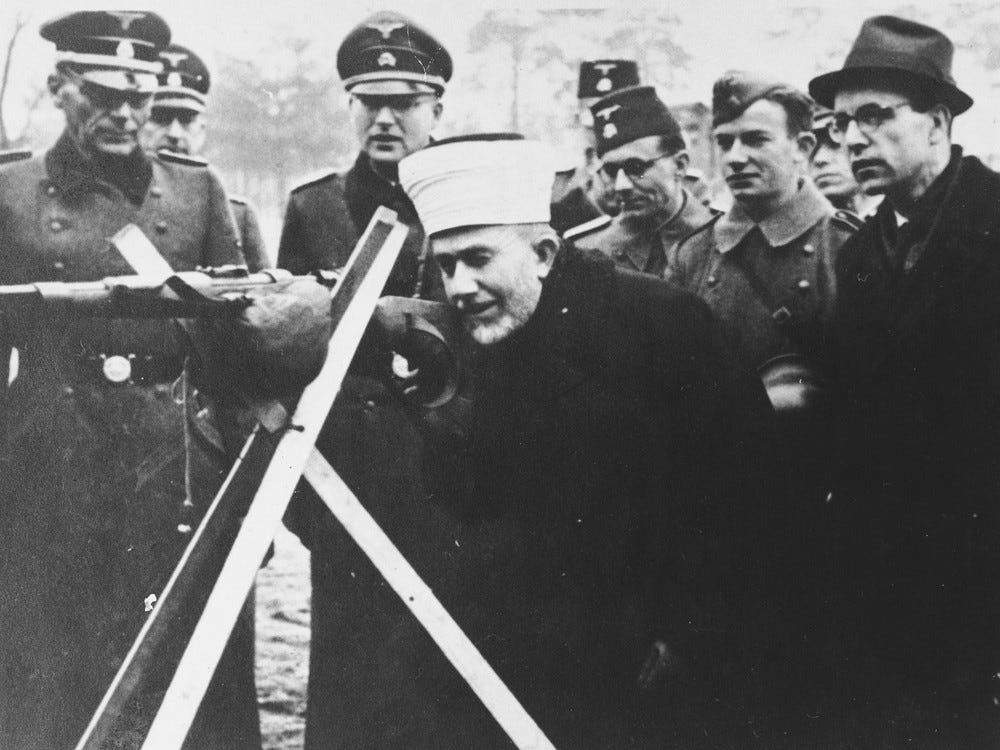On Ignorance and Islamism
Just over a year ago, in February of 2024, we ran a story about UNRWA and the UN’s material support of a terrorist organization, which also went out as a video on the Viktoria Evans YouTube channel.
We got a fair number of negative comments related to that story. We’ve posted many of them below; some called us ignorant, or biased, or said we didn’t know what we were talking about, or that we were genocidal racists, somehow. Others were more sinister, accusing us of spreading Israeli propaganda, and even of being Jewish, which neither of us are.
We put this history together as a form of rebuttal, and submit that we are not the uninformed or biased parties on this subject. We thought that in answering some of the inane questions we were asked, we might lead some people to the truth, while possibly also outraging more anti-semitic westerners that Islamists would murder without hesitation.
It works against us to talk about this topic - people take it as political content, which it’s not. We have lost paid subscribers, friends, and even relationships with family members over our willingness to criticize murderers who have publicly called for a global genocide against not only Jews but also Americans.
The story that led our latest paid subscriber to cancel their subscription was about the kidnap and murder of a mother and her two young children in which we called for the end of Hamas and all other caliphate groups.
The simple fact of the matter is that the behavior of Islamists is very similar to the behavior of the psychopathic murderers we typically write about. There is an abyss of difference between the gleeful, targeted torture, rape, and murder of civilians including women, children and infants, and the accidental killing of civilians in military actions.
Much of this lack of nuance is driven by a propaganda campaign targeting would-be intellectuals that has been so successful that many westerners believe the lies of Islamists wholesale.
These actions are not an acceptable tactic in modern warfare; they are an explicit violation of the Geneva convention and pretty much every other Law of War ever put to paper. They have much more in common with Israel Keyes and Columbine than with any alleged fight for freedom.
Many in the west seem blind to the fact that Islamists would murder them without hesitation. The Hamas founding charter openly says that “the infidels are of one nation,” and that the Islamic religion is the reason that Palestine, which Muslims colonized when it was controlled by Greek Byzantium, belongs only to Muslims.

Let’s take a short detour into etymology. First, Islamism. Before we get accused of racism despite the fact that neither Islam, nor Muslims, nor Palestinians are a race, let’s be crystal clear:
Islamism ≠ Islam.
Islamism is a philosophy within Islamic society that seeks to orient government and society “in accordance with [Sharia] laws [as] prescribed by Islam."
Second, Palestine, which is derived from the Greek word for “Philistine,” Philistia, which is derived from the Hebrew Pəlištī. Arabic has no phonetic “P”; They call it ”Falastin”.
The “original” people of Philistia disappeared after the Neo-Assyrian Empire invaded Canaan in 722 BC, and it is believed that the… - Philistians? Philistilians? - …were a Greek immigrant group from the Aegean, though no one is sure. Their name for themselves is unknown.
Who controlled the area changed many times over the centuries. Rome conquered the region around 63 BC, during the late Roman Republic, and called it Roman Judea.
The Greek Byzantine Empire, also known as Greek Byzantium and the Eastern Roman Empire, claimed the region during the reign of Emperor Justinian I in the 6th century, controlling wide swaths of what is now Syria, Palestine, Egypt, and North Africa.
They eventually lost most of this territory to the Arab Muslim conquests in the mid-7th century that eventually led to the Ottoman Empire. There was no district in the Ottoman Empire known as Palestine, but the word commonly referred to an area that extended from the Mediterranean into what is now Lebanon, Jordan, and Syria.
Now on to Gaza. In pre-Islamic Bedouin, “ghaza” was a form of asymmetric warfare, avoiding direct conflict in favor of loot-and-pillage style raids. The derivative ghāzī later became an honorific title assumed by Muslim rulers who extended the domains of Islam.
The Ottoman caliphate was the first to adopt both the philosophy of Islamism and the use of “ghaza” as an honorific. The institution of “ghaza” reaches back to the beginnings of the Ottoman state; Islamism developed just before its collapse.
Ottoman historian Ahmedi explained the meaning of Ghazi:
A Ghazi is the instrument of the religion of Allah, a servant of God who purifies the earth from the filth of polytheism. The Ghazi is the sword of God, he is the protector and the refuge of the believers. If he becomes a martyr in the ways of God, do not believe that he has died, he lives in beatitude with Allah, he has eternal life.
Hamas has been a designated foreign terrorist organization by the United States since 1997. Other countries who agree that Hamas are terrorists include Argentina, Australia, Austria, Belgium, Bulgaria, Canada, Croatia, Cyprus, Czechia, Denmark, Estonia, Finland, France, Germany, Greece, Hungary, Ireland, Israel, Italy, Japan, Latvia, Lithuania, Luxembourg, Malta, the Netherlands, New Zealand, Paraguay, Poland, Portugal, Romania, and the United Kingdom.
The Associated Press, on the other hand, suggests that “terrorism” is too vulnerable to politicization. The AP style guide for journalists (which news organizations worldwide rely on) suggests a preference for terms like “militants,” “fighters,” “attackers,” and “combatants,” which creates distorted understandings of the nature of the conflict.
Interestingly, the Associated Press not only shared an office building with Hamas in Gaza, but reportedly suppressed stories about the terror group.
“When Hamas’ leaders surveyed their assets before this summer’s round of fighting, they knew that among those assets was the international press. The AP staff in Gaza City would witness a rocket launch right beside their office, endangering reporters and other civilians nearby — and the AP wouldn’t report it,” according to a 2014 Atlantic piece by Matti Friedman.
Hamas militants would regularly “burst into the AP’s Gaza bureau and threaten the staff — and the AP wouldn’t report it.”
Not to be outdone by Hamas, the Palestinian Liberation Organization threatened an AP photog after he captured video of Palestinians young and old, coming together in the street to celebrate the September 11th attacks that killed thousands of American civilians.
To his credit, the photog released the video anyway. In East Jerusalem, a Reuters TV crew recorded comments from a Palestinian praising Osama Bin Laden. The Jerusalem Post reported that multiple journalists were threatened for capturing images of Palestinian celebrations, making real footage of the event harder to obtain.
Mysteriously, many of the original news articles about this have disappeared from the web, and are available only via the Wayback machine or from people who privately archived them.
For instance, the article “Whooping It Up In Beirut, even Christians celebrated the atrocity,” by Elisabetta Burba, an Italian journalist working out of Beirut who reported for the Wall Street Journal.
Burba wrote that despite attempts by local authorities across the middle east to hide how widespread the celebrations were, and cast the extremists as a minority:
Walking downtown, I realized that the offspring of this great civilization were celebrating a terrorist outrage. And I am not talking about destitute people. Those who were cheering belonged to the elite of the Paris of Middle East: professionals wearing double-breasted suits, charming blond ladies, pretty teenagers in tailored jeans.
Trying to find our bearings, my husband and I went into an American-style cafe in the Hamra district, near Rue Verdun, rated as one of the most expensive shopping streets in the world. Here the cognitive dissonance was immediate, and direct. The cafe's sophisticated clientele was celebrating, laughing, cheering and making jokes, as waiters served hamburgers and Diet Pepsi. Nobody looked shocked, or moved. They were excited, very excited.
An hour later, at a little market near the U.S. Embassy, on the outskirts of Beirut, a thrilled shop assistant showed us, using his hands, how the plane had crashed into the twin towers. He, too, was laughing.
Once back at the house where we were staying, we started scanning the international channels. Soon came reports of Palestinians celebrating. The BBC reporter in Jerusalem said it was only a tiny minority. Astonished, we asked some moderate Arabs if that was the case. "Nonsense," said one, speaking for many. "Ninety percent of the Arab world believes that Americans got what they deserved."
An exaggeration? Rather an understatement. A couple of days later, we headed north to Tripoli, near the Syrian border. On the way, we read that Palestinian leader Yasser Arafat, who donated blood in front of the cameras, was rejecting any suggestion that his people were rejoicing over the terrorist attack. "It was less than 10 children in Jerusalem," he said.
In the bustling souk of Tripoli we started looking for the Great Mosque, a 1294 building with a distinctive Lombard-style tower. But in that labyrinth, nobody spoke anything but Arabic, which we don't speak. Finally, in a dark shop, we found an old gentleman who knew French. His round white cap showed that he was a devout Muslim. Leaning on his stick, he managed to get on the street and with most exquisite manners gave us directions. Common decency survives all.
Once at the mosque I donned a black chador, but our Lonely Planet guide attracted the attention of a hard-looking bearded guy all the same. "Are you Americans?" he asked in a menacing tone. Our quick denial made him relax. He gave us the green light to go in. But very soon afterward we were again approached, by a fat young man.He turned out to be one of the 350,000 Palestinians who live in Lebanon, unwelcome by most of the population and subject to severe hardships. Hearing we were Italians, first he recited like a prayer names of Italian soccer players. We were relieved at first that he wanted to talk about sports, but he soon moved on to politics and the "events."
"My people have been crushed under the heel of American imperialism, which took away our land, massacred our beloved and denied our right to life. But have you seen what happened in New York City? God Almighty has drawn his sword against our enemies. God is great--Allah u Akbar," he said.
The distorted understanding created by the press in turn works to provide support for false claims. Although civilians die in military conflicts, there’s no evidence to substantiate that they are specifically targeted by the IDF and a lot of evidence to suggest that they’re not. Likewise, the modern American military.
Working backwards from the present day to address the questions and comments about our coverage, we will briefly mention the sadistic sexual violence inflicted by Hamas terrorists on civilian women and children, which included raping victims with knives and grenades as well as hammering nails into their genitals.
The screenshots above are taken from the report below which we have included for anyone interested in reading it for themselves.
Of the Palestinian women who Hamas claimed were raped following the emergence of the latest conflict, 0 of the actual victims reported sexual assaults and 0 reported being sexually assaulted with weapons.
8 complained that they were searched by female soldiers while fully dressed, 5 claimed battery or inappropriate touching, and 4 claimed they were subjected to inappropriate comments.
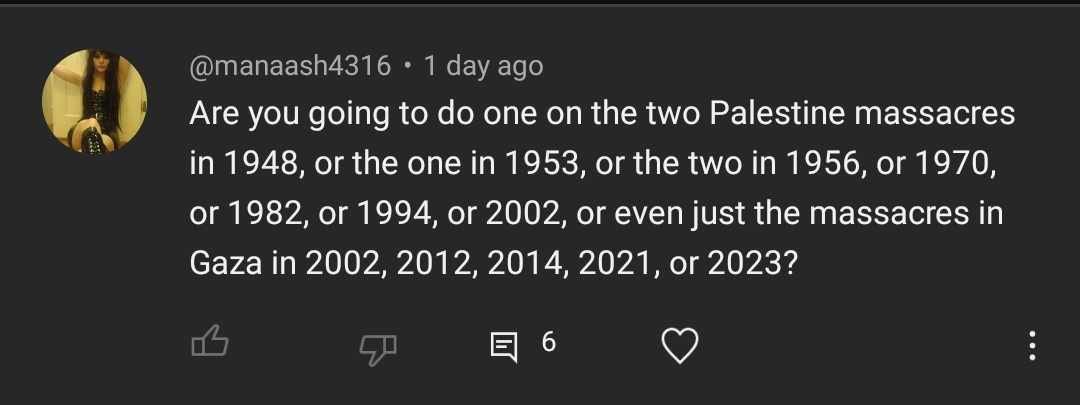
This list of “massacres” seemed like a list of semi random dates, not least of all because the conflict between Jews and Muslims in the region around Gaza dates back far before 1948 to the founding of Islam and the Islamic colonization of Greek Byzantium.
The inclusion of 2023 is particularly strange since there were no Israeli actions in Gaza in 2023 prior to the October 7 attacks, and 18 years prior to the attacks on October 7, in 2005, Israel withdrew from Gaza completely, which many people hoped meant a new era of Israeli-Palestinian peace.
The withdrawal led to Hamas becoming the de facto dictatorship in Gaza after the Battle of Gaza in 2007 between Hamas and Fatah, and the subsequent suspension of further elections in 2012 by Hamas.
Hamas grew out of the Muslim Brotherhood, which is also widely considered to be a terrorist organization, including in Egypt where it was founded.
The conflict in 2021 initially involved only police and civilians from both sides until rockets were fired at southern Israel from Gaza. The IDF retaliated by launching missiles at Hamas targets in Gaza.
By the time a ceasefire was declared, over 4,000 rockets had been fired from the Gaza Strip towards Israel, of which about a third fell short and hit Gaza itself. Hamas is more than happy to sacrifice innocent Palestinians for its cause.
The conflict in 2014 started after the kidnap murders of three Israeli teenagers in the West Bank, Eyal Yifrach, Gilad Shaer, and Naftali Fraenkel.
The conflict in 2012 consisted of mutual acts of combat that began after the Israeli army said they had opened fire on two Palestinians who entered a restricted zone near the security barrier at the border.
The conflict in 2002 was not a unique conflict but a continuation of an ongoing conflict involving acts from both sides which began in 2001 after a ceasefire brokered in June 2001 by then CIA director George Tenet fell apart.
The agreement called for Israel to withdraw from territory seized during the intifada and Yasser Arafat to clamp down on militants. Instead, militants exploded two car bombs targeting civilians in central Israel after Israeli helicopter gunships opened fire on three Palestinian militants in targeted killings.
Just two months later, Palestinians in the Gaza strip would hold public celebrations after the September 11th attacks perpetrated by Al Qaeda killed thousands of Americans.
1994 was smack in the middle of the Oslo Accord Process, which resulted in tentative agreements that fell apart after the failure of the Camp David Summit and the outbreak of the Second Intifada, the dates for which are not included on the list.
The Camp David Summit fell apart over Jerusalem and the Temple Mount, a hill in Old Jerusalem that’s been considered a holy site in both Judaism and Christianity for thousands of years, and in Islam for over a thousand.
The retaining walls were originally built by King Herod in the first century BC for an expansion of the Second Jewish Temple; the al-Aqsa Mosque and the Dome of the Rock were built by the Rashidun and Umayyad caliphates after the Islamic military conquests took the area by force from the Byzantine empire in 637 AD. The Dome of the Rock is one of the oldest Islamic structures in the world.
Palestinian Jerusalemites rioted during the summit after a call to defend the Temple Mount against Israeli visitors. This led to stone-throwing which Israeli police responded to with tear gas and rubber bullets while protesters continued to hurl stones and other projectiles.
Yasser Arafat, chairman of the Palestine Liberation Organization from 1969 to 2004 and president of the Palestinian National Authority from 1994 to 2004, was largely blamed for the failure of the Camp David summit.
President Clinton, who led the summit, said, "I regret that in 2000 Arafat missed the opportunity to bring that nation into being and pray for the day when the dreams of the Palestinian people for a state and a better life will be realized in a just and lasting peace."
In his autobiography My Life, Clinton also wrote about Arafat telling Clinton, "You are a great man."
Clinton responded, "I am not a great man. I am a failure, and you made me one."
Arafat was also blamed for the failure of the summit by Nabil Amr, a former minister in the Palestinian Authority, and former ambassador to the USSR and Egypt. A longtime critic of Arafat, Amr complained about corruption and cronyism in Arafat's administration, and in September 2002, after Amr called for reforms, Arafat had the chief of his special forces shoot up Amr's home.
In July 2004, Amr was shot twice in his right leg by a gunman firing through the window of his home in Ramallah. He had just gotten home following a television interview in which he criticized Arafat’s regime. His right leg had to be amputated at the knee. He believes the attack was meant to send a message, stifling calls for reform.
The Oslo Accords that Arafat scuttled were based on the 1978 Camp David Accords which led to a peace treaty between Egypt and Israel which was signed in March 1979, and also contributed to a peace treaty signed in October of 1994 between Israel and Jordan.
The Egyptian-Israeli peace treaty includes something called the “Agreed Activities Mechanism” in which Israel allows Egypt to deploy forces to the Sinai out of mutual security concerns, such as the presence of jihadi militant groups.
As recently as 2023 and 2013, Israel has allowed Egypt to deploy Egyptian troops in the Sinai for this purpose. Perhaps this is what 2023 refers to?
Things get more complicated going back to the 1950s; it’s unclear what the years 1953 and 1956 are a reference to. They could be a reference to the Gaza protectorate, which was established by the Kingdom of Egypt during the 1948 Arab–Israeli War. Gaza was under the administration of the now defunct Egyptian monarchy until 1959.
Egypt did not offer Gazan Palestinians citizenship during this time, nor allow them to move freely into Egypt, and issued them passports that were only recognized by six Arab countries, restricting their ability to travel abroad.
The Republic of Egypt, which lasted until 1958, and the Second Syrian Republic, which lasted until 1963, briefly merged to form a single state known as the United Arab Republic (UAR), which lasted until 1971 although Syria withdrew from the union in 1961 over perceived favoritism towards Egyptians.
In 1962, the UAR government established a Palestinian Legislative Council elected by the population, along with a constitutional document that stated quite clearly:
The Gaza Strip is an indivisible part of the land of Palestine and its people are part of the Arab Nation. The Palestinians in the Gaza Strip shall form a National Union composed of all Palestinians wherever they may be - its aim being the joint work to recover the usurped lands of Palestine, and the participation in fulfilling the call of Arab Nationalism.
The PLO was subsequently founded in 1964. A year later, mandatory conscription was instituted for the Palestinian Liberation Army (PLA), and two years after that two conflicts emerged.
1967 Suez Crisis and Six Day War/The War of Attrition
In 1967, weeks after Egypt blockaded the Straits of Tiran and cut off Israeli shipping access even though they had been told this would be considered an act of war, Israel attacked Egypt and quickly defeated the surrounding Arab states, occupying the Gaza Strip, along with the West Bank and other territory, ending Egypt's occupation of the region forever. Commonly known as the Six Day War, in the Arab world the Six Day War is called the Tripartite Aggression. It’s called the Sinai War in Israel.
After a 1967 Arab League summit refused any recognition of, or negotiations or peace with, Israel, what is called the War of Attrition followed, with Israel on one side and Egypt, Jordan, the PLA and other allies on the other, from 1967 to 1970.
When the Egyptian occupation of Gaza ended, the Israeli Military Governorate was established, which was replaced by the Israeli Civil Administration in 1981. De facto statehood was granted to Gaza in 2005, when Israel withdrew from Gaza entirely.
1948 is an apparent reference to the Israeli War of Independence, also called the civil war in British Mandatory Palestine, the 1948 Arab–Israeli War, and the 1947–1949 Palestine war, which broke out after the United Nations adopted a resolution in 1947 recommending the adoption of the Partition Plan for Palestine which included the establishment of the State of Israel following the holocaust.
When the British Mandate of Palestine expired in May of 1948, and with the Declaration of the Establishment of the State of Israel, the surrounding Arab states of the time — the Kingdom of Egypt, Transjordan, Iraq and Syria — invaded what had just ceased to be British Mandatory Palestine, and immediately attacked Israeli forces and Jewish settlements.
The conflict escalated into the 1948 Arab–Israeli War, which King Farouk of Egypt told the American ambassador to Egypt would end “when Arabs defeat the Jews and drive them out of Palestine,” and Azzam Pasha, the General Secretary of the Arab League, told the British ambassador to The Hashemite Kingdom of Transjordan, "We will sweep [the Jews] into the sea."
Earlier in 1948, the UN Palestine Commission had reported to the UN Security Council that, "Powerful Arab interests, both inside and outside Palestine, are defying the resolution of the General Assembly and are engaged in a deliberate effort to alter by force the settlement envisaged therein."
The “resolution of the General Assembly” was the result of the work of UNSCOP, the United Nations Special Committee on Palestine, which was created after the United Kingdom requested that the General Assembly "make recommendations under article 10 of the Charter, concerning the future government of Palestine".
Committee members were ignored and faced open hostility from local Arab muslims, including being cursed at, and having things thrown at them. Several Arab officials and intellectuals did privately meet with committee members to argue for an Arab-majority state.
Azzam Pasha told an Egyptian newspaper, "Personally I hope the Jews do not force us into this war because it will be a war of elimination and it will be a dangerous massacre which history will record similarly to the Mongol massacre or the wars of the Crusades."
Haj Amin al-Husseini, who was Grand Mufti of Jerusalem from
1921–1937 and “President” of what was the Egyptian controlled Gaza strip from 1948–1953, said in March 1948 in an interview with Al Sarih that the Arabs "would continue fighting until the Zionists were annihilated.”
The Arab Higher Committee, which was led by Husseini, demanded that Jews not even be considered citizens in a Palestinian Arab state.
Haj Amin al-Husseini also visited Trebbin, a subcamp of the Sachsenhausen concentration camp, in 1942.
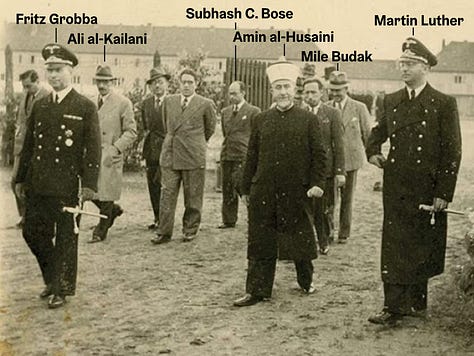
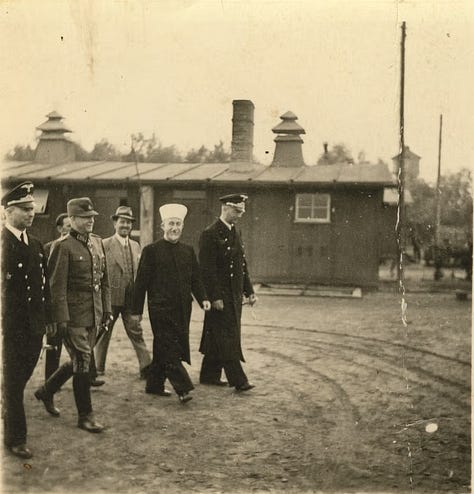

Arab leaders continued their anti-Jewish and Islamist policies unimpeded after the end of the war: al-Kailani until 1965 and al-Husseini until 1974. Outside of Israel, Nazism had hardly been delegitimized in the Middle East, and its adherents often came to power after the war ended. The Iraqi al-Kailani staged a coup in Baghdad but failed. He was sentenced to death, then exiled to Beirut.
Prior to this period, the Ottoman Empire collapsed after it entered the losing side of World War I, starting a genocide that resulted in the deaths of millions of Armenians in the Armenian genocide, as well as large-scale massacres carried out against Greek and Assyrian minorities as part of the same campaign of ethnic cleansing.

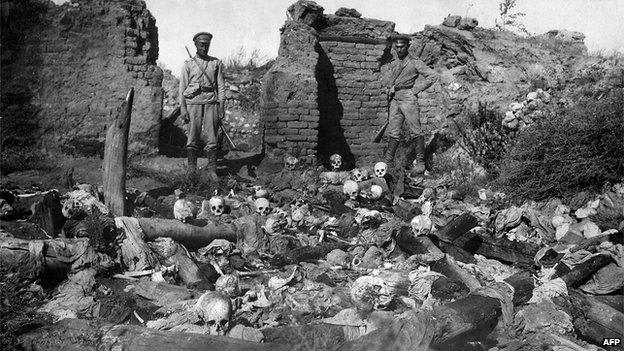
The genocide was carried out both during and after World War I, starting with the wholesale massacre of able-bodied males, followed by the deportation of women, children, the elderly and infirm on death marches leading to the Syrian desert. Driven forward by military escorts, the deportees were deprived of food and water and subjected to robbery, rape, and systematic massacre.
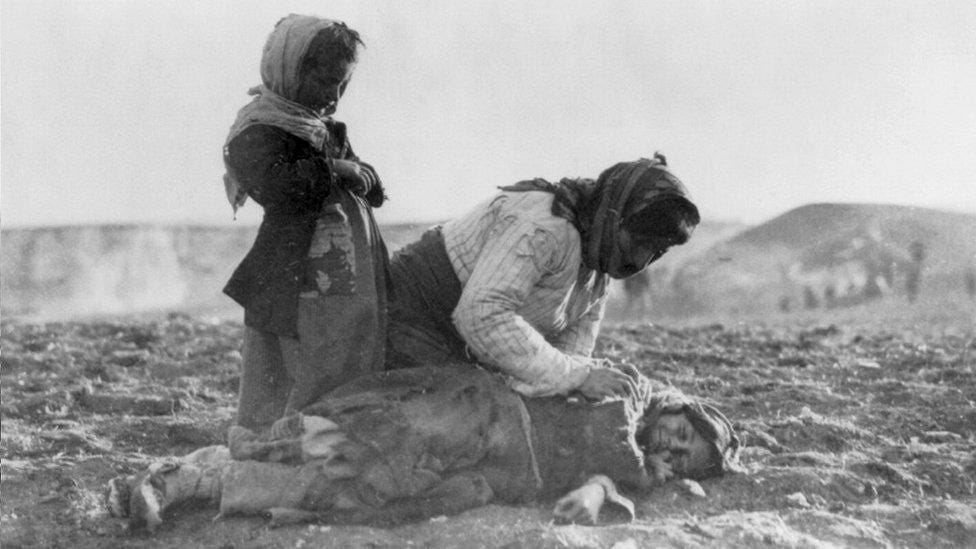
All of this conflict ultimately dates back to before the time of the Crusades, which were intended to reconquer Jerusalem and the surrounding area from the Muslim colonialists who had taken control of the region.
In 1095, after a request for aid from Byzantine emperor Alexios I Komnenos, Pope Urban II made a proclamation announcing the first expedition, offering military support to Byzantium by calling for an armed pilgrimage in the first of the Crusades.
These early Islamic conquests, also known as the Arab conquests, were initiated in the 7th century by the prophet Muhammad and continued by the Kaliphs who followed him.
Byzantine sources, such as Short History by Nikephoros, claim that the Arab invasion came after a trade war that saw restrictions imposed on Arab traders within Byzantine territory as a result of a conflict with the Saracen empire in Iran, who the Caliphate would also overrun.
The Arabs responded by murdering a Byzantine official named Sergius whom they held responsible for convincing the Emperor Heraclius to impose the trade restrictions.
As Islamic colonialism expanded further in the centuries that followed, the Ottoman Empire began its invasion of Greece in the 14th century and completed its conquest in the 15th century. Greece was subsequently under caliphate rule for nearly 400 years.
Greece was only liberated from the last caliphate with any power 200 years ago by a western coalition that included British and American citizens who fought next to Greek revolutionaries to ensure the freedom of Europe and the Mediterranean.
The same caliphate - the Ottoman empire - collapsed about 100 years ago. Let’s not pretend that bringing it back is some kind of social justice.






